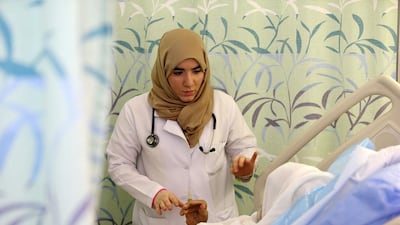When I was growing up in Texas in the 1970s, there were two things I wanted for my future. I wanted a career in computer science. And I wanted to be a mom.
Today, that plan sounds pretty unremarkable. But at the time, I didn’t know many women who had both a career and children at home. In fact, I didn’t know many women who had a career at all.
I was lucky, though, because I had a mother who told me I could be anyone I wanted to be, and a father who insisted that the fact I was a girl should never put a limit on my dreams. With their support, I earned a degree in computer science and got the job in software development I’d always wanted. And after Bill and I were married, I got to be a mom, too.
Now, I have three teenagers – two of them daughters– and when I think about how different the world looks to girls their age, I am hopeful. In both the US and the UAE, more women work outside the home than ever before, giving girls more role models in more fields than any previous generation.
Emirati girls who aspire to serve in government can look to the UAE Cabinet, now nearly one-third female, and know that they can lead, too. Girls with ambitions of working in technology can look to the scientists and engineers at the UAE’s space programme, where almost half the employees are female. And the fact that 72 per cent of students at national universities are female means that thousands of young Emirati women are already getting the education they need to make their own career dreams come true.
For these reasons, and many more, there has never been a better time to be born female. The data tells us that, all around the world, women are living healthier and better lives than ever before.
But the data also confirms that we still have more work to do to reach true gender equality, especially in the world’s poorest places.
Women and girls are more likely to live in poverty and less likely to get an education. Every day, 800 women die in childbirth. In some developing countries, women spend as many as nine hours a day doing routine chores to keep their households and families running, leaving no time to do almost anything else – like get a paid job, run for office, or start a business.
The world can’t afford to keep wasting this much human potential.
Empowering women isn’t only the right thing to do, it’s the smart thing. Because of the pivotal role women play in their families and communities, empowered women help drive progress faster for everyone.
Here are three ways we can help unlock women’s potential as agents of change.
First, invest in their health. Healthier women live better lives and are able to participate more fully in their communities. What’s more, they have healthier children – and healthier children grow up to be more productive in the workforce. That helps explain why one study found that every dollar invested in improving health returns at least $9 (Dh33) to low- and middle-income countries.
Second, ensure that women have decision-making power over their own lives. Women know what’s right for themselves and their families, and they should be able to act on it. The data tells us that when women have a voice in their families’ budget decisions, they prioritise things such as health care, nutritious food and education for their children – the building blocks of prosperous societies. Women should also have the right to decide if and when to get married – and the access to the contraceptives they need to decide if and when to get pregnant.
Third, connect women to economic opportunity. Women invest the majority of each dollar they make on their children, which is why when we invest in women, we invest in the people who invest in everyone else. When a woman has the option of working outside the home — and access to financial services so she can participate in the formal economy – families break the cycle of poverty and national GDPs rise.
We know progress is possible. We also know it won’t happen on its own. That’s where the UAE comes in.
As one of the world’s most generous supporters of foreign aid, the UAE has a unique position in the region – and an important voice in the global conversation. Other countries look to the UAE as they set their priorities. And we’ve seen that when the UAE mobilises around an issue, it drives results.
When the UAE and the Gates Foundation stood together in the fight against polio, the UAE’s efforts have helped move the world closer than it has ever been to eradicating the disease once and for all. As the UAE has made empowering women and girls a priority, both within its borders and beyond, there are even more amazing things ahead.
Our foundation and the UAE have both supported Every Woman, Every Child, a bold global health strategy aimed at improving the well-being of women, children and adolescents across the world. I hope that as the Emirates continues to keep women and girls at the centre of its agenda, we will have many more chances to work together on this issue in the future.
Already, the world looks different to our daughters than it did to us. But what will it look like to their daughters? And what about the daughters of the women in the world’s poorest places? What will the world look like to them?
If we work together, our visions of a better, more equal future can be the next generation’s reality.
Melinda Ann Gates is a philanthropist and co-founder of the Bill & Melinda Gates Foundation

